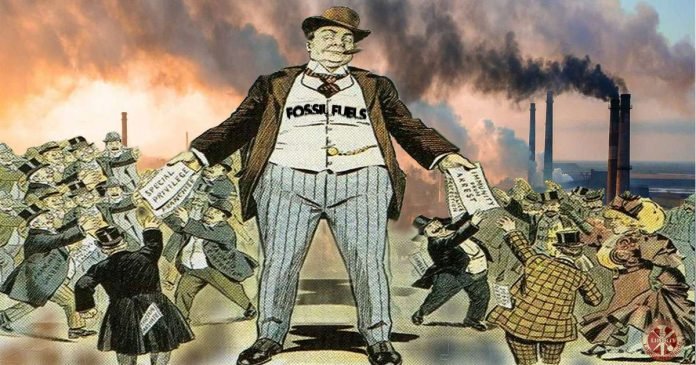Activists Slam ‘Weasel Words’ in New COP26 Text as Negotiators Water Down Climate Deal
A new draft of the COP26 cover deal released on Friday appeared to be backing away from a call to end all use of coal and phase out fossil fuel subsidies completely.
The latest draft proposal from the meeting’s chair calls on countries to accelerate “the phaseout of unabated coal power and of inefficient subsidies for fossil fuels.”
A previous version published on Wednesday had called on countries to “accelerate the phasing out of coal and subsidies for fossil fuel.”
The change in wording suggested a shift away from unconditional demands that some fossil fuel exporting nations have objected to.
The text is still likely to undergo further negotiation at the talks, due to end Friday.
“The key line on phasing out coal and fossil fuel subsidies has been critically weakened, but it’s still there and needs to be strengthened again before this summit closes. That’s going to be a big tussle and one we need to win, “Greenpeace chief Jennifer Morgan.
COP26: Negotiators Water Down Climate Deal
“The oily imprints of fossil fuel influence” are all over an updated draft text, climate leaders warned.
The latest text was released on the last official day of a conference swarming with oil and gas lobbyists. A final text is still being negotiated.

Common Dreams
Climate advocates warned Friday that “the fingerprints of the fossil fuel industry” are all over a COP26 draft decision text released in the waning hours of the summit in Glasgow, Scotland, where campaigners and scientists have implored world leaders to take ambitious steps to curb planet-warming emissions.
The new text—released on the last official day of a conference swarming with oil and gas lobbyists — dampened lingering hopes of a firm international commitment to phase out the use of fossil fuels, the primary driver of the global climate emergency.
Earlier this week, activists offered cautious praise following the release of a draft document that mentioned fossil fuels for the first time in more than two decades of United Nations climate talks.
The updated draft, however, waters down even that inadequate language, adding what one environmentalist called “weasel words” that could leave the door open for the continued funding of fossil fuel projects.
Whereas an earlier version urged nations to “accelerate the phasing-out of coal and subsidies for fossil fuels,” the new text calls on countries to accelerate “the phaseout of unabated coal power and of inefficient subsidies for fossil fuels” — qualifiers that drew immediate criticism from observers.
“Our leaders need to have the courage to talk openly about what we are transitioning from: oil, gas, and coal,” Catherine Abreu, founder and executive director of Destination Zero, said in response to the draft.
Saudi Arabia, Australia, Russia, and China were reportedly attempting to remove the fossil fuel language entirely. A final version of the text, which must be agreed upon by all 197 parties to COP26, is still being negotiated.
Jennifer Morgan, executive director of Greenpeace International, said in a statement that while there is “wording in here worth holding on to,” the “key line on phasing out coal and fossil fuel subsidies has been critically weakened.”
“But it’s still there and needs to be strengthened again before this summit closes,” said Morgan. “That’s going to be a big tussle and one we need to win. Meanwhile, we’ve gone from ‘urging’ countries to strengthen their 2030 emissions targets in line with the 1.5°C goal to merely ‘requesting’ they do so by 2022. It wasn’t good enough before, it’s even weaker now, and that needs to change.”
Jean Su of the Center for Biological Diversity argued that the latest draft “shows the oily imprints of fossil fuel influence.”
“The credibility of these talks is in question if landmark language around fossil fuels gives them a lifeline through carbon capture technologies and continued subsidies,” Su added. “We need more than weak gestures towards ‘low-emission’ energy. To have any hope of preserving a livable planet, we need to ignite a zero-emission revolution now.”
The updated text came at the tail end of a summit that’s featured soaring rhetoric from world leaders, including U.S. President Joe Biden, on the need for coordinated global action against the “existential threat” of the climate emergency. But such words have been accompanied by pledges that advocates and researchers say are nowhere sufficient to keep warming below 1.5°C by the end of the century, the Paris Agreement’s more ambitious target.
According to researchers behind the Climate Action Tracker, global greenhouse gas emissions in 2030 will be roughly twice as high as necessary to limit warming to 1.5°C even if nations’ pledges — including those issued in Glasgow — are met.
In a powerful speech to COP26 attendees on Thursday, Vanessa Nakate — a 24-year-old climate activist from Uganda — warned that “we are drowning in promises” and said she is “actually here to beg you to prove us wrong.”
“Commitments will not reduce CO2,” said Nakate. “Promises will not stop the suffering of the people. Pledges will not stop the planet from warming. Only immediate and drastic action will pull us back from the abyss.”
Watch:
United Nations Secretary-General António Guterres — who is facing pressure from young activists to declare a “systemwide climate emergency” — similarly cautioned Thursday that promises emerging from COP26 will “ring hollow when the fossil fuel industry still receives trillions in subsidies.”
“We need pledges to be implemented. We need commitments to turn concrete. We need actions to be verified,” Guterres said in his address to the summit. “We need to hold each other accountable — governments, non-state actors, and the civil society. Because only together can we keep 1.5 degrees within reach.”
This article is from Common Dreams.80
Tags: COP26 UN Secretary-General António Guterres
Support Independent Journalism Today
Our unwavering dedication is to provide you with unbiased news, diverse perspectives, and insightful opinions. We're on a mission to ensure that those in positions of power are held accountable for their actions, but we can't do it alone. Labour Heartlands is primarily funded by me, Paul Knaggs, and by the generous contributions of readers like you. Your donations keep us going and help us uphold the principles of independent journalism. Join us in our quest for truth, transparency, and accountability – donate today and be a part of our mission!
Like everyone else, we're facing challenges, and we need your help to stay online and continue providing crucial journalism. Every contribution, no matter how small, goes a long way in helping us thrive. By becoming one of our donors, you become a vital part of our mission to uncover the truth and uphold the values of democracy.
While we maintain our independence from political affiliations, we stand united against corruption, injustice, and the erosion of free speech, truth, and democracy. We believe in the power of accurate information in a democracy, and we consider facts non-negotiable.
Your support, no matter the amount, can make a significant impact. Together, we can make a difference and continue our journey toward a more informed and just society.
Thank you for supporting Labour Heartlands












